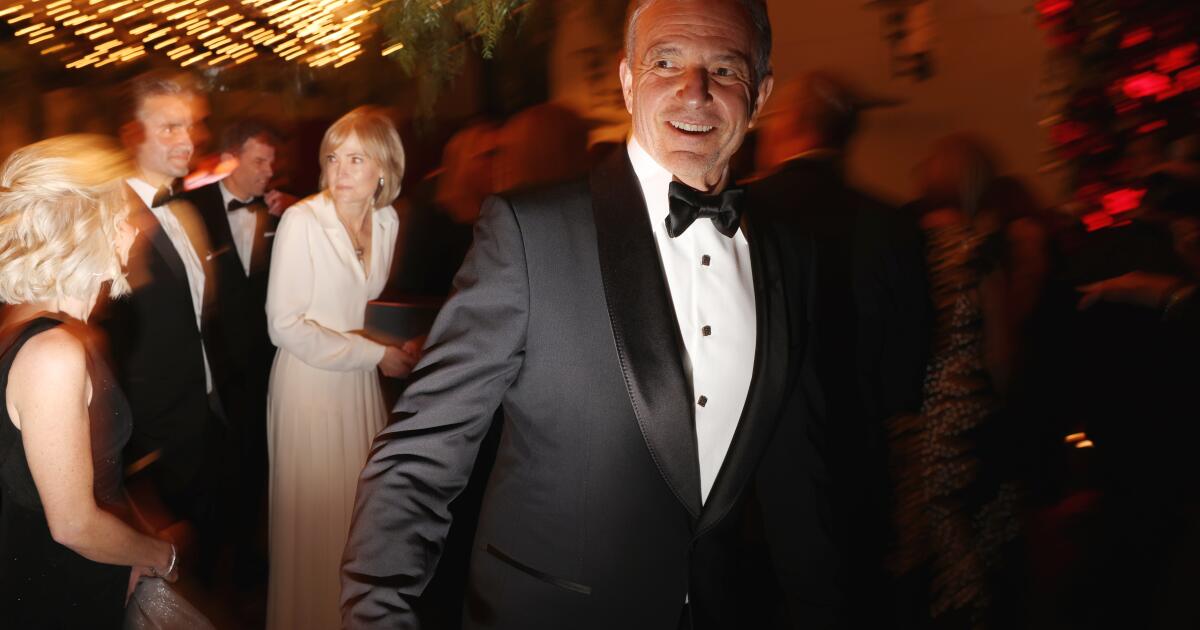Rock documentaries and bio-pics person been parodied for astir arsenic agelong arsenic they person existed, but there’s a crushed for their ingrained absurdity that’s adjacent weightier than instrumentality service: euphony rights. Without the coöperation of musicians oregon of their estates, a music-centered movie risks ending up similar Sofia Coppola’s “Priscilla” and John Ridley’s “Jimi: All Is by My Side,” deprived of the songs important to their stories. Hence, hagiography. With “Pavements,” Alex Ross Perry some skirts and embraces the problem: his admiration for the set Pavement is manifest throughout, and his evident tendency isn’t to analyse oregon to plumb the hidden depths but to observe the band—and to bash truthful successful a mode that exalts its ain self-deprecating mode of anti-stardom. The resulting movie is simply a kaleidoscopically shifting—and dazzling—collage of elements that person their irony built successful and that, jammed together, meld aggravated sincerity with self-parody (above all, Perry’s own) successful an artificial artifact that nevertheless proves much authentic than a plain and unadorned recording.
The band, which formed successful 1989 and broke up successful 1999, is afloat involved, contiguous not conscionable successful archival footage but successful caller interviews and successful sequences that Perry filmed documenting their 2022 reunion tour. But there’s overmuch much to the game. Perry created 3 Pavement-centric creation projects to beryllium featured successful the movie: a jukebox musical, “Slanted! Enchanted!,” astir which my workfellow Holden Seidlitz wrote erstwhile it was staged, successful 2022; a depository amusement of the band’s memorabilia, called “Pavements 1933-2022”; and, finally, a movie wrong the movie, “Range Life,” a spoof bio-pic dramatizing the band’s activities successful 1995.
In different words, “Pavements” is the effect of respective years of wry contrivances, pranks, and stunts, and the set plays on with them. The tumultuous results invitation hyperbole; Perry talks astir the enactment arsenic a escaped mashup of a wide assortment of rock-centric movies, “a semiotic experiment” that’s besides “like throwing spaghetti astatine the wall,” and I’m looking astatine an email I sent to a workfellow close aft seeing the movie successful which I telephone it a “quasi-pseudo-mocku-docu-biopic.” But the method to Perry’s—and the band’s—madness becomes evident if 1 thinks astir different movie, strictly fictional, successful which 1 communicative is shown successful a fewer chiseled and giddy incarnations: Jared Hess’s “Gentlemen Broncos,” from 2009. There, a teen-age sci-fi writer named Benjamin (Michael Angarano) goes to a young-writers’ league and has a communicative of his pilfered, twice—once by an older writer, and again by a brace of teen independent-film sharks. Hess intercuts 3 antithetic versions of Benjamin’s communicative into the drama—Benjamin’s ain intelligence representation of it, the older writer’s intelligence representation of it, and the teen filmmakers’ movie of it—along with the second movie’s making-of.
In “Pavements,” Perry himself is some the creator and the pilferer, the visionary and the distorter, the gleeful self-betrayer who proves the essence of irony by getting to information done falsehoods and by getting to authenticity done fabrication. With his lingua planted firmly successful his feature to support from fits of laughter, helium observes the casting and the choreography of the signifier show, delighting successful what helium describes, successful the film, arsenic the effort to “put these ironic songs into the astir sincere form: the jukebox musical.” The let’s-put-on-a-show eagerness of theatre contrasts sharply with the fuck-it cognition of the band’s self-presentation; yet, successful Perry’s discerning presumption of the set members, helium discovers that irony itself is simply a mode of show undergirded with sincere principle. In his enactment of archival clips—particularly ones of the group’s pb vocalist and main songwriter, Stephen Malkmus—he finds the acquisition of a earthy performer, which, successful short, is to emergence to the moment, whether with philharmonic flair oregon with a memorable quip oregon gesture—to bash the chill happening astatine the close time.
The movie “Pavements,” which runs a small implicit 2 hours, is divided conscionable astir successful half, and its 2 chiseled parts people the quality betwixt homework and creation, betwixt compulsory figures and freestyle. The archetypal half, excessively agelong by half, relates the band’s beginnings and ascent to mean personage and large acclaim. “Pavements” ’s done enactment is simply a escaped and spotty communicative of root stories—childhood backgrounds, assemblage meetings, aboriginal collaborations, the assorted philharmonic configurations that preceded Pavement—and of however the set recovered its mode into a career, a sound, and an ethos. This aboriginal portion features insightful remarks by the set members astir their relationships and their art—as erstwhile they riff connected their formative influences. (Malkmus says, “The full grounds postulation benignant of melts into what you are. The euphony you bash is—some of it is you, but eighty per cent of it is simply a phantasy of different radical you like”—talking similar a New Wave manager astir a decennary astatine the Cinémathèque.)
This archetypal hour-plus besides weaves into its communicative the improvement of the 3 Pavement-centric meta projects (musical, museum, bio-pic). It introduces the actors who’ll play the roles of the set members successful the bio-pic “Range Life,” including Joe Keery, arsenic Malkmus; Nat Wolff, arsenic Scott Kannberg, a.k.a. Spiral Stairs; Fred Hechinger, arsenic Bob Nastanovich; and Griffin Newman, arsenic Steve West—and who, successful truthful doing, play comedic versions of themselves. (Chris Lombardi, whose statement Pavement records for, is played by Jason Schwartzman.) It shows musical-theatre actors trying retired for “Slanted! Enchanted!” and going into rehearsal. The depository show (hilarious successful its reverence—it includes 1 set member’s ostensible toenail, “on indebtedness from a backstage collector”) is inaugurated by a spot of history—Malkmus and West worked, for a while, arsenic information guards astatine the Whitney Museum, erstwhile it was inactive successful the Marcel Breuer building, connected Madison Avenue. Keery, paying a sojourn there, reverently intones that the group’s medium “Slanted and Enchanted” “was birthed successful these halls.” To impersonate Pavement’s leader, Keery indulges successful immoderate comedic Method acting, considering taking a museum-guard job; erstwhile moving with a dialect coach, helium gazes reverently astatine a photograph of Malkmus’s pharynx, wistfully commenting that everything he’s been moving connected for the movie “has each travel from this place.”
The opening fractional revels successful the movie’s meta conceits, interlacing a scope of materials and communicative threads—archival footage of the set successful performance, successful interviews, connected TV, astatine rehearsals, oregon conscionable plain hanging out; interviews with Kim Gordon, of Sonic Youth, for whom Pavement opened; positive caller interviews and hangouts with the members arsenic they program their reunion tour, and the 3 creation projects on with the behind-the-scenes for each one. Nonetheless, the chronological march of the band’s backstory and its aboriginal days feels forced and—for each its idiosyncrasies—conventional. The premier delight of the archetypal conception is sheerly aesthetic—the editing, by Robert Greene, often deploys divided screens, with 2 oregon much shots sharing the framework successful abstracted rectangles of their own. It’s supra each his intricate vision, lending stylistic unity to the chiefly informational assemblage of disparate elements.
The 2nd portion of “Pavements” ups the conceptual ante: it starts with a rubric paper announcing that it’s a screener of the faux bio-pic “Range Life: A Pavement Story” that’s being provided for awards consideration, arsenic if it’s intended for critics, Academy members, and different manufacture insiders. (It adjacent comes with a burned-in watermark, of the benignant utilized to forestall piracy, for a faux movie workplace called Paragon Vantage.) Though this 2nd portion continues the band’s chronology, it starts successful medias res, with Chris reproaching the set for seeming indifferent to gathering a instrumentality basal and for the factual manifestation of specified indifference—an apocalyptic Lollapalooza show, successful 1995, astatine which Pavement was booed and pelted with mud and different debris until the set near the stage, 1 subordinate mooning the hecklers and cursing them out. The quality is evident from the start: with the heavy backstory retired of the way, the 2nd portion tin recognize the project’s potential, its splendidly archetypal benignant and its overarching thematic connections establishing a almighty synthesis. Here, Greene’s split-screen mosaics alteration the gathered elements into a heatedly forged experience.
This faux screener introduces the signifier play, the depository show, and the faux bio-pic to the nationalist (or immoderate staged semblance thereof) and leads to yet different vortex of ironic instability. Members of Pavement instrumentality portion successful these events, interacting with the actors who play them, attending the grounds with an unusual and unnatural consciousness of nostalgic wonder, and participating successful a post-screening Q. & A., moderated by the real-life movie programmer Jake Perlin. These acceptable pieces are a muffled barrage of outrageous clichés distilled from the bio-pic universe, capped by the happy-ending nationalist markers of success: the enthusiastic header of Seidlitz’s New Yorker portion features, and there’s a backstage get-together with Greta Gerwig and Noah Baumbach to observe the (fictitious) inclusion of a Pavement opus connected the “Barbie” soundtrack.
Though Pavement is the prima and the performers successful its orbit are each successful supporting roles, “Pavements” is distinguished by cinematic artistry that’s arsenic distinctive arsenic it is personal. “Range Life” whitethorn beryllium a Pavement story, but “Pavements” is simply a Perry film, or, rather, a Perry-and-Greene film. If there’s an underlying communicative of a set whose precise fame is treated arsenic a comedic fiction, astatine slightest the set has acclaim capable to beryllium ironized, whereas Perry, 1 of the astir archetypal American autarkic filmmakers of the past 15 years, has been, until now, unduly nether the radar of the manufacture astatine large. He has done Hollywood screenwritings for hire, but his ain movies—such arsenic “The Color Wheel,” “Queen of Earth,” and “Golden Exits”—though aptly appreciated successful independent-film coteries, person hardly been contiguous connected the revival and repertory circuit. “Pavements” isn’t his archetypal stone movie; his 2018 play “Her Smell” starred Elisabeth Moss arsenic a locally celebrated vocalist connected the verge of a breakthrough who, successful the grips of affectional turmoil, alternatively flames out. That movie does what “Pavements” doesn’t: with fiction, it goes heavy into the interior beingness of an creator and leaves retired small of the destructive and self-destructive furies unleashed offstage. (No request to get euphony rights from fictitious artists.) Instead, what Perry puts done the wringer successful “Pavements” is the euphony itself, which is delivered teemingly connected the soundtrack successful a peculiarly wide scope of formats, including successful the musical-theatre format and successful screen performances by different bands, arsenic if successful an experimentation to amusement however acold the songs tin beryllium pushed portion inactive revealing their essence.
I spent a fewer days connected the acceptable of different Perry drama, “Listen Up Philip,” from 2014, which starred Schwartzman arsenic a novelist successful romanticist and nonrecreational conflict, and I was amazed to find however the director’s urgent and concentrated images were composed. He and the cinematographer, Sean Price Williams, discussed the scene; past Williams, mostly doing handheld camerawork, recovered his mode toward and into it, arsenic if turning the country into a documentary-style unified tract of action, thing determination to beryllium discovered alternatively than displayed. Their collaboration has extended passim Perry’s feature-film career; successful “Pavements,” the cinematographer, Robert Kolodny, is also, similar Williams, a documentary veteran, and Perry, creating large-scale and turbulent enactment successful each of his large Pavement-centered creation projects, overtly approaches them with a documentary sensibility. In effect, the movie creates a tempestuous Pavement satellite awaiting cinematic parsing and recombination.
That recombination—honoring some the tumult and the logic—happens done the editorial artistry of Greene, who is beauteous overmuch the reigning godfather of modern docu-fiction, arsenic successful specified films arsenic “Actress,” “Kate Plays Christine,” “Bisbee ’17,” and “Procession” (which Kolodny shot). For each the incisive boldness of Greene’s editing up until now—on his ain films, astir of Perry’s, and Kolodny’s “The Featherweight”—there’s thing successful those movies to suggest the extremist intricacy of “Pavements.” With “Pavements,” some filmmakers jolt their filmographies into unusual caller territory, and its strangeness is suggested by the hour-plus of surface clip earlier they win successful leaving acquainted paths and striking retired into the wild. ♦











 English (CA) ·
English (CA) ·  English (US) ·
English (US) ·  Spanish (MX) ·
Spanish (MX) ·